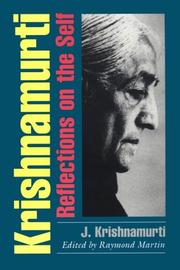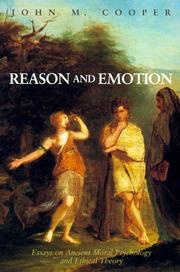| Listing 1 - 3 of 3 |
Sort by
|

ISBN: 0812693558 Year: 1999 Publisher: Chicago / La Salle, Illinois Open Court
Abstract | Keywords | Export | Availability | Bookmark
 Loading...
Loading...Choose an application
- Reference Manager
- EndNote
- RefWorks (Direct export to RefWorks)
authority --- psychology --- philosophy --- Krishnamurti --- self-awareness

ISBN: 1282607235 9786612607233 0226313883 9780226313887 9780226313832 0226313832 9780226313849 0226313840 0226313832 0226313840 9781282607231 6612607238 Year: 1999 Publisher: Chicago University of Chicago Press
Abstract | Keywords | Export | Availability | Bookmark
 Loading...
Loading...Choose an application
- Reference Manager
- EndNote
- RefWorks (Direct export to RefWorks)
In his third book of poems, Mark Halliday grapples with the endless struggle between self-concern and awareness of the rights of others. Through humor, ironic twists, and refreshing candor, these poems confront a variety of situations-death, divorce, artistic egotism and envy, personal relationships-where the very idea of self is under siege. "If Selfwolf were a pop music CD, it would be hailed as Mark Halliday's breakthrough album. . . . This third collection of poems teems with unsparing confessions of misdirected lust, lost faith, regret and a winningly goofy cheerfulness in the face of all that bad stuff. . . . The informal, conversational quality of Halliday's work almost hides its artfulness, which seems to be precisely his intention."-Ken Tucker, New York Times Book Review "With unflinching, often comic honesty about how 'ego-fetid, hostile, grasping' we are, Halliday exposes the self's wolfish hungers and weaknesses."-Andrew Epstein, Boston Review "Mark Halliday's new book offers more of his trademark riffs on self-consciousness. His subversive, surprising, hugely enjoyable poems will make you laugh out loud, squirm in uncomfortable recognition, and appreciate anew the comedy of our daily battles for self-preservation. . . reading Halliday is pure delight. . . . I love the daring and intelligence with which Halliday skates along the shifting boundary between self within and world outside. Selfwolf slows down our habitual negotiations between 'in here' and 'out there,' exposing the edgy comedy of how we survive."-Damaris Moore, Express Books
American poetry. --- Poetry, Modern. --- Modern poetry --- Poetry --- American literature --- poems, poetry, poet, literature, literary, self-concern, concerning, awareness, self-awareness, rights, humanity, connection, others, humor, humorous, irony, ironic twists, candor, honesty, truth, death, divorce, mourning, marriage, relationships, art, artistic, artists, ego, egotism, envy, jealousy, self, confessions, lust, faith, conversational, recognition, reality, boundaries, collection, comedy.

ISBN: 0691058741 069105875X 9780691058757 Year: 1999 Publisher: Princeton, N.J. Princeton University Press
Abstract | Keywords | Export | Availability | Bookmark
 Loading...
Loading...Choose an application
- Reference Manager
- EndNote
- RefWorks (Direct export to RefWorks)
This book brings together twenty-three distinctive and influential essays on ancient moral philosophy--including several published here for the first time--by the distinguished philosopher and classical scholar John Cooper. The volume gives a systematic account of many of the most important issues and texts in ancient moral psychology and ethical theory, providing a unified and illuminating way of reflecting on the fields as they developed from Socrates and Plato through Aristotle to Epicurus and the Stoic philosophers Chrysippus and Posidonius, and beyond. For the ancient philosophers, Cooper shows here, morality was "good character" and what that entailed: good judgment, sensitivity, openness, reflectiveness, and a secure and correct sense of who one was and how one stood in relation to others and the surrounding world. Ethical theory was about the best way to be rather than any principles for what to do in particular circumstances or in relation to recurrent temptations. Moral psychology was the study of the psychological conditions required for good character--the sorts of desires, the attitudes to self and others, the states of mind and feeling, the kinds of knowledge and insight. Together these papers illustrate brilliantly how, by studying the arguments of the Greek philosophers in their diverse theories about the best human life and its psychological underpinnings, we can expand our own moral understanding and imagination and enrich our own moral thought. The collection will be crucial reading for anyone interested in classical philosophy and what it can contribute to reflection on contemporary questions about ethics and human life.
Philosophical anthropology --- General ethics --- Antiquity --- Ethics, Ancient. --- Morale ancienne --- Plato --- Aristotle --- Ethics. --- 1 <38> --- 17 --- Ethics, Ancient --- Ancient ethics --- Griekse filosofie --- Filosofische ethiek --- -Aristoteles --- Aflāṭūn --- Aplaton --- Bolatu --- Platon, --- Platonas --- Platone --- Po-la-tʻu --- Pʻŭllatʻo --- Pʻŭllatʻon --- Pʻuratʻon --- Πλάτων --- אפלטון --- פלאטא --- פלאטאן --- פלאטו --- أفلاطون --- 柏拉圖 --- 플라톤 --- Ethics --- 17 Filosofische ethiek --- 1 <38> Griekse filosofie --- Aristoteles --- Aristote --- Aristotile --- Platon --- Platoon --- Arisṭāṭṭil --- Aristo, --- Aristotel --- Aristotele --- Aristóteles, --- Aristòtil --- Arisṭū --- Arisṭūṭālīs --- Arisutoteresu --- Arystoteles --- Ya-li-shih-to-te --- Ya-li-ssu-to-te --- Yalishiduode --- Yalisiduode --- Ἀριστοτέλης --- Αριστοτέλης --- Аристотел --- ארסטו --- אריםטו --- אריסטו --- אריסטוטלס --- אריסטוטלוס --- אריסטוטליס --- أرسطاطاليس --- أرسططاليس --- أرسطو --- أرسطوطالس --- أرسطوطاليس --- ابن رشد --- اريسطو --- Pseudo Aristotele --- Pseudo-Aristotle --- Платон --- プラトン --- アリストテレス --- 17 Moral philosophy. Ethics. Practical philosophy --- Moral philosophy. Ethics. Practical philosophy --- Antiochus. --- Athenaeus. --- Bruns, Ivo. --- Burkert, W. --- Chrysippus. --- Cicero. --- Diotima. --- Epictetus. --- Isocrates. --- Kelsey, Sean. --- Lucretius. --- Marcus Aurelius. --- Mitsis, Phillip. --- Olympiodorus. --- Penner, T. --- Plotinus. --- Posidonius. --- Priam. --- Strauss, L. --- akrasia. --- altruism. --- animals. --- co-instantiation. --- courage. --- death. --- dialectic. --- educators. --- empiricism. --- ethics. --- eudaimonism. --- flourishing. --- goods, external. --- hedonism. --- imagination. --- incontinence. --- interentailment of virtues. --- justice. --- knowledge. --- language. --- moral psychology. --- motivations, human. --- music. --- nature. --- nonrational desires. --- objectivity. --- oratory. --- perfection. --- phantasiai. --- piety. --- rhetoric. --- self-awareness. --- suicide.
| Listing 1 - 3 of 3 |
Sort by
|

 Search
Search Feedback
Feedback About UniCat
About UniCat  Help
Help News
News